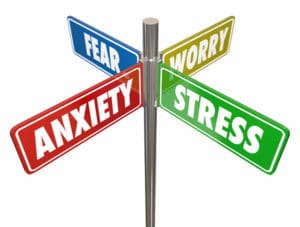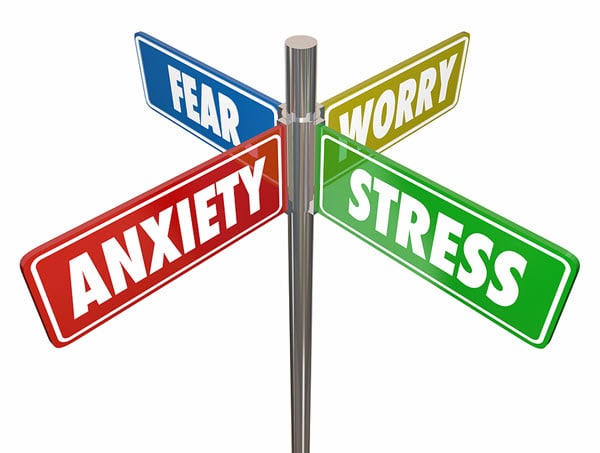Table of Contents
If you feel anxious, some nootropics can make you feel better by helping to calm your mind. They work by supporting the brain chemicals that control mood and stress. Certain amino acids and ingredients such as L-Tyrosine and Bacopa Monnieri can help you to feel and stay relaxed, focused and happy. The aim of this guide is to help you find the best nootropics for anxiety and how they can make you feel more at ease.
In a hurry?
If you’re in a hurry or just looking for my nootropic of choice when it comes to easing anxiety, I would recommend Mind Lab Pro. The formula has been created based on research and can help you to stay calm, focused and stress-free. Unlike other supplements, its clean, effective and can be used long term to improve your overall brain health. – Click here to learn more about Mind Lab Pro
Key Takeaways
- Understanding the root causes of anxiety, often associated with neurotransmitter imbalances, is crucial.
- Certain nootropics can be effective in alleviating anxiety symptoms by targeting specific neurotransmitters.
- Acetylcholine, dopamine, and GABA are some neurotransmitters related to anxiety, and supplements like Alpha GPC, CDP-Choline, and L-Tyrosine can help modulate their levels.
- A trial-and-error approach may be necessary to find the most effective nootropic for individual anxiety relief.
- Nootropics offer a natural alternative to traditional anti-anxiety medications, with the potential for fewer side effects1.
This post is for you if tried anti-anxiety meds, Cognitive Behavioral Therapy, counseling, or psychotherapy. And are looking for a natural nootropic alternative to reduce anxiety.
Or maybe you tried talking to your doctor about how you feel and didn’t get the help you need.
It may be of little comfort, but did you know there is a 77% chance that your anxiety has been misdiagnosed as some physical problem instead?[i]
Because anxiety often manifests as sweating, trembling, nausea, abdominal problems, dizziness, insomnia, heart palpitations, accelerated heart rate, chest pain, shortness of breath, pins and needles, feeling like your losing control and/or feelings of impending doom.
Instead of dealing with the real cause, maybe you were sent down the wrong path. And are still looking for answers.
Nootropic supplements may help if you’re dealing with a genuine anxiety disorder. The kind of anxiety that has you feeling constantly on-edge and an overwhelming sense of dread.
The type of anxiety where you have difficulty concentrating, you’re irritable or restless to the point you’re avoiding family and friends just to numb yourself from feelings of worry and unrelenting doom. Stress hormones go nuts.
You know, it’s that very type of stress that makes your blood pressure rise from doing too much, or being stretched thin and depression symptoms start to peak through your window and you may even begin to manifest this unresolved energy into panic attacks? Yeah, we’re talking about that kind.
Here you’ll discover the real cause of your anxiety symptoms. And get some help dealing with how you feel. Concrete steps to take that doesn’t include meditation, yoga, Cognitive Behavioral Therapy, or psychoanalysis.
The Root Cause of Generalized Anxiety Disorder
Something may have happened that triggered the anxiety that has turned your life upside down. But if your feelings of anxiety are hanging on and won’t let go, it’s likely because of the dysfunction of neurochemicals in your brain.[ii]
It could be problems with acetylcholine, dopamine, GABA, glutamate, norepinephrine, or serotonin.
But the challenge is figuring out which neurotransmitter is causing the problem. And why drugs like benzodiazepines, SSRIs, SNRIs, TCAs, and MAOIs are often prescribed for treating anxiety.
How to Find the Root Cause of Your Anxiety Symptoms
 If you have been using an anti-anxiety drug and experienced some relief in your symptoms, you have a head-start.
If you have been using an anti-anxiety drug and experienced some relief in your symptoms, you have a head-start.
Because now you have a clue what could be causing your problem. And it may be easier for you to decide which nootropics to try to help you get better and reduce your anxiety.
First, become familiar with the mechanism of action (or pharmacology) of the med you are using. Find out how the drug works in your brain. Wikipedia.org is a good resource for this information.
Simply do a search of Wikipedia for your drug’s generic name. And scroll down to the section “Pharmacology”. Sometimes called the “mechanism of action”.
Once you understand how the drug works in your brain. And which neurotransmitter system it affects. Scroll down the list of nootropic supplements below.
And choose one of the anti anxiety nootropics that has a similar mechanism of action to the drug you were using. Then follow the dosage recommendations for that supplement and try it to see if you feel any anxiety relief.
Typical signs of relief can include positive cognitive performance like reduced brain fog and mental fatigue, less emotional stress, and lowered blood pressure.
Anxiety Caused by Neurotransmitter Dysfunction
Anti-anxiety meds are usually some type of benzodiazepine. Benzos work on GABA receptors. So, a nootropic that boosts GABA may help relieve your anxiety.
But if you’ve never tried using an anti-anxiety med to treat your anxiety, or have used one that didn’t work, you’re anxiety may be caused by something other than GABA.
This is where trial and error and the willingness to experiment comes into play. And this is how it works.
Start at the beginning of the list below and try the first nootropic supplement for 1 or 2 days. And see how you feel. If you experience relief from your anxiety symptoms and improved mental health, success!
Now you know which neurotransmitter to work with. You can continue using that nootropic as recommended. And look for other natural nootropic adaptogens that work on the same system.
For example, if L-Tyrosine helps relieve your anxiety symptoms then you know that dopamine is your problem. But if L-Tyrosine is not enough and only provides some relief, then look for other nootropic supplements that also affect dopamine.
Other supplements that affect how dopamine works in your brain include Oat Straw extract, Polygala Tenuifolia, L-Theanine, St. John’s wort, and Ginkgo Biloba.
But if L-Tyrosine doesn’t provide any comfort for lowering your anxiety, put it aside. And try the next nootropic on the list below for a couple of days again following dosage recommendations.
Go through the list one-by-one until you find a nootropic that helps you and relieves at least some of your anxiety symptoms.
Most of the nootropics on the list below are precursors. Which means it provides the chemical or molecule needed to make or increase levels of a specific neurotransmitter.
Let’s get started …
 Neurotransmitter imbalances
Neurotransmitter imbalances
Acetylcholine
Acetylcholine is your major signaling neurotransmitter and plays a critical role in learning and memory. And acetylcholine levels are modulated by levels of stress in several regions of your brain.
Acetylcholine levels also decline as you get older. You need choline for the production of acetylcholine. Not eating enough foods high in choline can also result in insufficient acetylcholine.
In fact, choline is so vital to cognition and nerve function that, without it, we couldn’t move, think, sleep or remember anything.
Studies show that acetylcholine signaling in your hippocampus regulates social stress resilience and anxiety.[iii]
The only two nootropic supplements that can effectively increase acetylcholine levels in your brain are Alpha GPC or CDP-Choline (Citicoline) used with the cofactors Acetyl L-Carnitine (ALCAR) along with Vitamins B1 & B5, magnesium and Vitamin D.
Alpha GPC
 Alpha GPC is a precursor to the neurotransmitter acetylcholine. Alpha GPC naturally occurs in your brain as a byproduct of phosphatidylcholine (PC).
Alpha GPC is a precursor to the neurotransmitter acetylcholine. Alpha GPC naturally occurs in your brain as a byproduct of phosphatidylcholine (PC).
When your brain needs more choline, and the choline floating around in your brain is running low, it breaks down PC from cell membranes. And turns it into Alpha GPC.
Alpha GPC, acetyl L-carnitine (ALCAR), and phosphatidylserine (PS) provide mitochondrial support and conserve growth factor receptors.
DHA (Omega-3) combines with phosphatidylcholine (PC) and phosphatidylserine (PS) to form brain cell membranes critical for neuron generation and regeneration.[iv]
Recommended dosage of Alpha GPC is 300 mg 3-times per day.
And I use and recommend: Performance Lab® Omega-3 which provides your brain with DHA. And Mind Lab Pro® which provides Phosphatidylserine (PS) along with 10 other effective nootropic ingredients.
CDP-Choline (Citicoline)
CDP-Choline is a type of choline that is present in every cell in your body.
Taken as a supplement, it’s then converted to cytidine and choline in your gut. Once it crosses the blood-brain barrier it’s converted back to CDP-Choline.[v] The choline then assists cell membranes and helps create acetylcholine.
CDP-Choline is involved in memory and cognitive functions. And provides energy for the brain to conduct sustained mental effort.
Recommended CDP-Choline dosage is 250 – 300 mg twice per day. I use and recommend Mind Lab Pro® which contains 250 mg Citicoline.
And by the way, you only need to use one to test your acetylcholine levels. Use either Alpha GPC or CDP-Choline with Acetyl L-Carnitine (ALCAR). There is no need to use both. Either one will work.
Dopamine
L-Tyrosine taken as a nootropic supplement converts into the neurotransmitter dopamine. The cofactors in dopamine synthesis include Vitamin B6, B9, & B12, magnesium and Vitamin D.
 Dopamine helps control muscle movement in your body, is fundamental to memory, attention and problem solving.
Dopamine helps control muscle movement in your body, is fundamental to memory, attention and problem solving.
The unused dopamine can then convert into the catecholamine neurotransmitters norepinephrine (noradrenaline) and epinephrine (adrenaline).
Norepinephrine is important for attentiveness, emotions, sleeping, dreaming, and learning.
Epinephrine drives your ‘flight-or-flight’ response. It’s what prompts your reaction to dangerous circumstances, emergency situations, or in stressful situations or environments.
Sleep deprivation and extreme stressors like heat and cold can deplete catecholamine levels. L-Tyrosine restores them to preserve optimal cognition and reduce anxiety.[vi]
Recommended dosage of L-Tyrosine is 500 mg twice per day.
I use and recommend Mind Lab Pro® which contains 175 mg N-Acetyl L-Tyrosine along with 10 other potent and effective nootropic ingredients.
GABA
GABA (Gamma-amino butyric acid) is the most abundant inhibitory neurotransmitter in your brain. And known to counterbalance the action of the excitatory neurotransmitter glutamate.
GABA has long been recognized as the main regulator of anxiety. And the GABA neurotransmitter system is the main target of benzodiazepines and other anxiety related drugs used to treat anxiety disorders.[vii]
When GABA is taken as a nootropic supplement, and contrary to what you may have read elsewhere, crosses your blood-brain barrier, it binds with the GABAA receptor protein complex, and acts as an agonist: inducing changes in which the permeability of the central pore to chloride ions gets increased.
The resulting chloride flux hyperpolarizes the neuron, leading to a reduction in its excitability. And producing a general inhibitory effect on neuronal activity.[viii]
Recommended dosage of GABA is 250 – 500 mg per day. I use and recommend PharmaGABA® which is a natural form of GABA grown on lactobacillus hilgardii bacteria. Several supplement manufacturers license the use of PharmaGABA® so it is easy to find in your local vitamin shop or online.
Glutamate
L-glutamine is a ‘conditionally’ essential amino acid and main precursor for the production of glutamate and GABA in your brain.
(NOTE: Don’t confuse glutamine with glutamate!)
Glutamine is the most abundant amino acid in your body. And is involved in many of your bodily functions. Including much of the activity in your brain.
 But Glutamate is the main excitatory neurotransmitter in your brain.[ix] And the balance of glutamine and glutamate is critical for optimal brain function.
But Glutamate is the main excitatory neurotransmitter in your brain.[ix] And the balance of glutamine and glutamate is critical for optimal brain function.
Glutamate plays various important positive roles in your brain including brain development, learning and memory.
And degenerative roles including stroke, traumatic brain injury, Huntington’s and Alzheimer’s disease, stress response, and anxiety disorders.
Glutamate mainly acts through ion channel receptors including NMDA receptors, AMPA receptors, and G protein-coupled metabotropic receptors (mGluR1-8).
Glutamate is involved in synaptic release of acetylcholine, adenosine, kappa opioid, GABA, and neuropeptides.[x]
Recent research shows that glutamate dysfunction is involved in fear conditioning, OCD, PTSD, anxiety disorder and social phobia.[xi]
Monosodium glutamate (MSG) which is used as a flavor enhancer has been linked to obesity, metabolic syndrome, and neuron toxicity that can lead to cell death causing stroke, epilepsy, schizophrenia, anxiety, depression, Parkinson’s disease, Alzheimer’s disease, Huntington’s disease, and amyotrophic lateral sclerosis (ALS).[xii]
Eliminating your anxiety could be as simple as avoiding all foods containing MSG.
When your neurotransmitters, including L-glutamine and glutamate are in balance, you feel motivated, productive, and energetic. And you feel calm and relaxed during downtime.
When L-glutamine levels are low you feel filled with dread, you’re constantly worried, you have racing thoughts, and you’re frequently late and disorganized.
When you are in this L-glutamine slump is when you’re tempted to resort to high carbohydrate foods, and drugs or alcohol to relax.
Recommended dosage of L-Glutamine is 2 – 5 grams per day.
But remember, glutamine and glutamate must be in balance! If you suspect your glutamate levels are too high, you can get it under control by inhibiting its NMDA and AMPA receptors.
Some antidepressant drugs relieve anxiety by inhibiting NMDA receptors.[xiii]
Try the nootropics including Cat’s Claw[xiv], and L-Theanine[xv] for inhibiting NMDA receptors. And Noopept[xvi] and many of the racetams[xvii] which inhibit AMPA receptors.
Keeping glutamate under control and helping to reduce anxiety if your condition is caused by glutamate dysfunction.
Serotonin
Serotonin plays a significant role in the development and persistence of anxiety disorders.
 Several studies show that increases in serotonin increases anxiety. And when serotonin decreases you may experience a reduction in the anxiety that’s associated with OCD or PTSD[xviii].
Several studies show that increases in serotonin increases anxiety. And when serotonin decreases you may experience a reduction in the anxiety that’s associated with OCD or PTSD[xviii].
Too much serotonin and excess serotonin signaling has been implicated in social anxiety disorders.[xix]
If you are experiencing any type of anxiety, you should avoid anything that increases serotonin. Do NOT use nootropics like L-Tryptophan or 5-HTP. Because L-Tryptophan or 5-HTP are the only nootropic supplements that can directly increase serotonin levels.
Instead, use nootropics that help modulate serotonin and bring it under control.
Bacopa Monnieri helps modulate serotonin and dopamine which produces an anxiolytic effect. Studies show that Bacopa Monnieri is as effective as the anti-anxiety drug lorazepam in reducing anxiety.[xx]
Vitamin D3 and Omega-3s (EPA & DHA) helps control serotonin synthesis and action. EPA helps inhibit serotonin release and DHA influences serotonin receptors. While Vitamin D3 deficiency can contribute to anxiety.
Supplementing with Omega-3s and Vitamin D3 may help reduce anxiety.[xxi]
I use and recommend Performance Lab® Omega-3 and Performance Lab® (NutriGenesis®) Vitamin D3 + K2
Ginkgo Biloba acts as a monoamine oxidase inhibitor (MAOI) which helps boost dopamine in your brain. Increasing dopamine can help lower serotonin levels. The result can be a reduction in anxiety.[xxii]
Rhodiola Rosea is an adaptogen that has been used in traditional medicine for thousands of years. Rhodiola Rosea enhances stress tolerance and relieves anxiety by modulating key brain neurotransmitters such as serotonin, norepinephrine and beta-endorphins (opioid neuropeptides).[xxiii]
Anxiety Disorders Eliminated
Nootropics can be a viable and potent alternative to many anti-anxiety medications.
But you first need to determine the cause of anxiety in your brain. Use the trial and error method I suggested above and work through the nootropic supplements I recommended one-by-one.
If you are not experiencing any results from taking a single nootropic, it may be that a combination of nootropics may be required to get the job done, and once the cross the blood brain barrier, have an effect.
Just remember, that the goal of experimenting is to find what works best for you is so you can determine what gets you the best results for reducing stress, improved mental energy, and reduce anxiety symptoms.
But a very strong word of caution – if you are currently using any prescription anti-anxiety or antidepressant medications. Or any medications for that matter. Research each nootropic including side effects and prescription drug interactions before using them.
You can relieve anxiety and start feeling some relief from stress, Hopefully once-and-for-all by using the right nootropic supplements.
But this will only work if you do your research. And are willing to experiment until you find the nootropic supplements that are right for you, and mental clarity will come.
What Do I Recommend?
If you’re looking for a stack to help improve brain health, my recommendation would be Mind Lab Pro. The formulation of L-Tyrosine, Bacopa Monnieri and Rhodiola makes it a great nootropics for anxiety. It can help you with managing anxiety by reducing stress, balancing mood levels and enhancing focus.







Join The Discussion - 190 comments
Kevin
July 19, 2022
Hallo David,
my doctor diagnosed me with anxiety, panic disorder and depression. Neverless i think social anxiety is bothering me the most.
He adviced me to take Propranolol and Flunarizine.
Do you have a suggestion for a natural remedy ?
Thank you very much.
David Tomen
July 20, 2022
Kevin, it depends on what is causing your anxiety, panic disorder and depression. If it is caused by a neurotransmitter dysfunction you need to figure out which one it is before you can do anything about it. How to do that is explained in the above article.
If you need more help you can always schedule a consultation with me here: https://calendly.com/davidtomen/60-minute-consultation-with-report
Momof4
May 4, 2022
Hi
I only have half of my intestines. Half of each one has been removed. Everytime I try to take any supplement it either gives me diarrhea or constipation. Do you know anything about topical use of nootropics? I have tried using dphenalalanine topically and it did lessen my pain and maybe my anxiety but I got really bad diarrhea. I just wondered if you have any experience or advice for a situation like this. Thank you so much!
David Tomen
May 5, 2022
There are very few nootropic supplements that I am aware of that can be used sublingually. But none that can be used topically.
The only other thing I can suggest trying is opening the capsules and dissolving them in a glass of something you can drink. That will work with anything that is water soluble. But for fat-soluble supplements you need a tablespoon of some kind of ‘healthy’ oil. I use unrefined coconut oil.
You should also try a Prebiotic (https://bit.ly/2KzeQi2) which will help not only rebuild your microbiome. But should also lessen the bouts of constipation and diarrhea.
val
April 25, 2022
hello david,
i took the Dr. Braverman test that i saw linked in one of the comments to try to gauge which neurotransmitter was at the root of my anxiety and my results indicated that i had moderate deficiencies in dopamine and choline, and major deficiencies in GABA and serotonin. I am a little confused by this as your article states that increasing serotonin INCREASES anxiety so how can i be majorly deficient in it but still experiencing anxiety? should i still try to increase serotonin or should i just focus on balancing the others? i am currently taking 3000 mg of fish oil a day (2000 dha: 1000 epa) with D3.
also i found the section on glutamine and glutamate difficult to understand. how do you know which one is out of balance?
David Tomen
April 25, 2022
Val, excess or too much serotonin can cause anxiety. But that’s not your problem. The opposite in fact. I suggest trying each of the precursors I suggest in the article above and see which one helps you the most.
You may end up using all of them but at doses other then what is normally used. Trial and error is the only way to figure this out.
val
April 25, 2022
hi david thank you very much for your reply. I do intend on trying out the others but as far as supplementing serotonin, is the fish oil counterintuitive to that goal? the article says that fish oil inhibits serotonin release and influences serotonin receptors. so is this something i should not take while trying to increase serotonin?
thanks again
David Tomen
April 26, 2022
Val, not ‘fish oil’ but DHA which is found in Omega-3s. And the highest levels of DHA are found in phosphatidylserine (PS) which in turn helps in the storage, release and activity of all major neurotransmitters and their receptors.
DHA will support the use of each of the neurotransmitter precursors I mentioned in this article.
Katherine
March 29, 2022
I have very bad dysbiosis and gut inflammation, along with terrible anxiety, fear and depression. I am starting l glutamine. Is this the best supplement for my leaky gut and head issues? What do you think of the theory that all emotional problems have their origin in the gut?
David Tomen
March 29, 2022
Katherine, many ’emotional problems’ begin in the gut. Remember, most of the GABA and serotonin your body produces is made in your gut.
L-Glutamine is well-known for helping heal a leaky gut. Here are some other ideas as well: https://nootropicsexpert.com/how-to-heal-a-leaky-blood-brain-barrier/
Kevin Anderson
March 6, 2022
Hi David, I have been on 2-3mg of Xanax for the past 5 years initially for PTSD. I am sick of being so dependent on benzos every day. I want to wean my self off or at least to a much smaller dose. Is there anything you can recommend to help with the withdrwal feelings I get when I try to decrease my daily intake? I have tried to wean myself down, but after a day or two at a lower dose my anxiety goes thru the roof and I can feel weird sensations in my body, almost like an electrical tingling sensation in my skin. Then I take some xanax and it goes away. So I know my body is physically adicted or dependend on the benzos. Thank you! Kevin
David Tomen
March 7, 2022
Kevin, I have consulted with many coming off of benzos. There are supplements that may help and definitely supplements to stay away from. But way too many and too complex to go into here in the comments thread. If you are interested I suggest scheduling a consultation. Here is a link to my calendar: https://calendly.com/davidtomen/60min
Gary Smith
February 25, 2022
Hi David, I’m not really sure where to start! I’ve had anxiety my entire life. More along the lines of hypervigilence, excessive worry, fear, obsessive thoughts. When it worsens it manifests in my chest.
I was on a cocktail of Abilify, Zoloft and Lamictal. I have been off of them for about 2.5 years now.
I think the Zoloft did make some difference in the anxiety. That being the case, do you have a suggestion on where to start?
I have been taking one 300 mg pill of Alpha GPC per your recommendation for choline for about two weeks. I can up it to twice a day to see if that helps.
Any thoughts would be appreciated.
David Tomen
February 25, 2022
Gary, if Zoloft worked then reverse engineer that. We know Zoloft acts primarily on serotonin so try supplementing with L-Tryptophan 500 mg before bed. And it may have some effect on dopamine and norepinephrine as well so try L-Tyrosine 500 mg twice during the day.
But for hypervigilance, fear, and obsessive thoughts you’re going to need to set up a consultation because that takes much more of an explanation than I can do here.
Gary Smith
February 25, 2022
Thanks, David. I have tried 500 mg Tryptophan off and on for sleep over the past two years as I developed insomnia from getting off of the meds. It did not help and I swear the depression felt worse the next day. Should I try again?
David Tomen
February 28, 2022
Gary, if it did not work and made things worse then is sounds like Serotonin is not your problem. I suggest experimenting with the other precursors I detail in this article. One-at-a-time for a day or two. And see if you can figure out which neurotransmitter is dysfunctional.
If you give each one a chance and still no success then it is something else causing your symptoms. It may be problems with inflammation, neurogenesis, hormones, nutrient deficiencies, a dysfunctional microbiome or leak gut/brain.
Brielle
December 8, 2021
In this article, it says not to take 5-HTP because high serotonin can contribute to anxiety. But from what I’ve read, if you’re taking L-Tyrosine (which raises dopamine and decreases serotonin) you should also take 5-HTP to balance it out. If you take L-Tyrosine regularly without 5-HTP, will serotonin levels get too low and cause problems?
David Tomen
December 9, 2021
Brielle, dopamine and serotonin must be in balance. And if you are increasing dopamine by using L-Tyrosine your best and safest long-term option for raising serotonin is with L-Tryptophan. Not 5-HTP.
Rick
March 17, 2022
So if you use L-Tyrosine for anxiety you must also use L-tryprophan? This is very contradicting to what you wrote in the article. You stated not to use any form of sertonin.
David Tomen
March 17, 2022
Rick, that’s not what I said. I said excess serotonin can cause things like anxiety.
But dopamine and serotonin must be in balance. So if you are using 500 mg L-Tyrosine twice per day for any length of time you will end up depleting serotonin. And you’ll be worse off than when you started.
Jurgen Felice
October 7, 2021
Hi, social encounters always give me an uncomfortable feeling. The amount of discomfort depends on how well I know the people and also the number of people. The more unknown and the more people heo bigger the chance that my discomfort even goes into an anxiety feeling or even panic. Social encounters don’t give me energy, but actually cost me energy. I am 44, when I was younger I think some higher Testosteron levels just motivated me to go past this discomfort and just do it, but even then in my younger years it always costed me energy. But I just went for it and did it. This behaviour of just doing it hasn’t solved it though.
Now being 40+ I detect that I am more and more using strategies to escape from social encounters. Also by judging people too fast, which probably is my protection mechanism to give me a reason not to have social encounters anymore.
I however wish to solve this and it would be great if nootropics can help me. I never took meds for my anxiety, but last months I have been investigating and experimenting with some Nootropics already and taking them like 60 minutes before social encounters of which I think that might cause me anxiety. The supplements have been somewhat successfull but to be honest I want to go more and more beyond my comfort zone and I think I need stronger nootropics. I now use a cocktail of this:
88Herbs Zen+ (2 capsules)
Silexan Lavender 1 capsule 80mg
Lemon Balm from 600mg (Cyracos from ND)
Valerian Extract 450mg (6:1 extract so 2700 raw valerian)
GABA Sublingual 250mg
I also every day take Fishoil, D3, B-complex and C. Also started using ND’s 10% Tongkat Ali to increase Testosteron. I never tested my Testosteron but I already detect that it does something because I feel more dominant and eager to do stuff. Slightly more aggresive attitude. I was too soft before I think.
I also just started using Saffran Affron extract 2x 15mg per day. I’ve read it acts like an SSRI that might help on the Serotonine.
Anyway, my plan is to go into social encounters that I never tried before and I know these kind of encounters will cause me a lot of anxiety for sure. But I know also that if I manage to survive these encounters that they might help me to solve my social anxiety issues.
Any recommendations what I should add to my cocktail to be able to handle going way over my social comfort zone?
David Tomen
October 8, 2021
Jurgen, have you seen my article on “social anxiety?” https://nootropicsexpert.com/best-nootropics-for-social-anxiety/ You may get some ideas that will help you from that article.